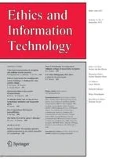Abstract
There are many reports about the digital divideand many discrepant interpretations of what thereports indicate. This pattern of competinganalyses, often in relation to identical datasets, has endured for a good part of the lastdecade. It is argued here that a major problemwith much of the digital divide research is afailure to include ethical concerns as anexplicit part of analyzing and interpretingdigital divide gaps. If researchers includemore recognition of ethics with their findingsabout divide gaps, it is likely that they willproduce better research and findings as well asmore defensible linkages between study reportsand policy deliberations.
Similar content being viewed by others
References
D.M. Anderson. Cautious Optimism about Online Politics and Citizenship. In D. Anderson and M. Cornfield, editors, The Civic Web, pp. 19–34. Rowman and Littlefield, New York, 2003.
T.K. Bikson and C.W.A. Panis. Computers and Connectivity: Current Trends. In R. Anderson, T. Bikson, S. Law and B. Mitchell, editors, Universal Access to e-mail: Feasibility and Societal Implications. RAND, Santa Monica, CA, 1995. Available: http://www.rand.org.
S. Braman. The Politics of the Empirical. ICA News. International Communication Association, Austin, Texas, March, 2002, p. 5.
M. Castells. The Internet Galaxy: Reflections on the Internet, Business, and Society. Oxford University Press, New York, 2001.
M. Castells. End of Millennium. Blackwell, Malden, MA, 1998.
M. Castells. The Power of Identity. Blackwell, Malden, MA, 1997.
M. Castells. The Rise of the Network Society. Blackwell, Malden, MA, 1996.
B. Compaine. Information Gaps: Myth or Reality? In B. Compaine, editor, The Digital Divide: Facing a Crisis or Creating a Myth? (pp. 105–119). MIT Press, Cumberland, RI, 2001.
L.A. Day. Ethics in Media Communications. Wadsworth, Belmont, CA, 1991.
N. Dickard. Federal Retrenchment on the Digital Divide: Potential National Impact. Benton Foundation, Policy Brief No. 1, March. Benton Foundation, Washington, DC, 2002.
Falling Through the Net: A Survey of the “Have Nots” in Rural and Urban America, 1995. Available: http://www.ntia.doc.gov/ntiahome/fallingthru.html.
Falling Through the Net II: New Data on the Digital Divide, 1998. Available: http://www.ntia.doc.gov/ntiahome/net2
Falling Through the Net: Defining the Digital Divide, 1999. Available: http://www.ntia.doc.gov/ntiahome/fttn99/contents.html
Falling Through the Net: Toward Digital Inclusion, 2000. Available: http://www.ntia.doc.gov/ntiahome/fttn00/contents-00.html
L. Floridi. Computer Ethics: Mapping the Foundationalist Debate (with J.W. Sanders). Ethics and Information Technology 2002 (4.1), 1–9 [pdf], 2002.
J. Fulk, A.J. Flanigan, M.E. Kalman, P.R. Monge and T. Ryan. Connective and Communal Public Goods in Interactive Communication Systems. Communication Theory, 6: 60–87, 1996.
K. Hacker. Network Democracy and the Fourth World. European Journal of Communication Research, 27: 235–260, 2002.
K. Hacker and R. Steiner. Hurdles of Access and Bene-fits of Usage for Internet Communication. Communication Research Reports, 18: 399–407, 2001.
K. Hacker and J. van Dijk. Digital Democracy: Issues of Theory and Practice. Sage, London, 2000.
J. Horrigan and L. Rainie. The Broadband Difference: How Online Americans' Behavior Changes with High-Speed Internet Connections at Home, 2002. Available: http://www.pewinternet.org
J. Jung, J. Qiu and Y. Kim. Internet Connectedness and Inequality: Beyond the “Divide.” Communication Research, 28(4): 507–535, 2001.
L. Kvasny and D. Truex. Defining Away the Digital Divide: A Content Analysis of Institutional Influences on Popular Representations of Technology, pp. 1–16 [pdf], 2001. Available: http://www.cis.gsu.edu/dtruex/Presentations/kvasny-Truex01.pdf
Making Technologies Work for Human Development. Human Development Report. United Nations, New York, 2001. Available: http://www.undp.org/hdr2001.
A. Massey. Twisted Logic Fails to Eliminate Sad Fact That Digital Divide Exists. Houston Business Journal: June 24, 2002.
A Nation Online: How Americans Are Expanding Their Use of the Internet, 2002. Available: http://www.ntia.doc.gov/ ntiahome/dn/nationonline_020502.html
E. Newberger. Home Computers and Internet Use in the United States: August 2000. U.S. Department of Commerce, Washington, DC, 2001.
E.M. Rogers. Communication Technology. Free Press, New York, 1986.
J. Schement. Of Gaps by Which Democracy We Measure. In B. Compaine, editor, The Digital Divide: Facing a Crisis Or Creating a Myth? pp. 303–310. MIT Press, Cumberland, RI, 2001.
T. Spooner and L. Rainie. African-Americans and the Internet. Pew Internet and American Life Project. October 22, 2000. Available: http://www.pewinternet.org/reports/pdfs/ PIP_African_Americans_Report.pdf
B. Tranter and S. Willis. Beyond the Digital Divide: Socio-Economic Dimensions of Internet Diffusion in Australia. 2002 Conference on the Digital Divide: Technology and Politics in the Information Age, 2002. Available: www.pac-rim.org
J. Van Dijk. The Ideology Behind Closing Digital Divides: Applying static Analysis to Dynamic Gaps. IAMCR and ICA Symposium on the Digital Divide, November 15–17, 2001. Austin, Texas, 2000.
J. Van Dijk. Widening Information Gaps and Policies of Prevention. In K. Hacker and J. van Dijk, editors, Digital Democracy: Issues of Theory and Practice, pp. 166–183. Sage, London, 2000.
J. Van Dijk. The Network Society. Sage, London, 1999.
J. Van Dijk and K. Hacker. The Digital Divide as a Complex and Dynamic Phenomenon. The Information Society, in press.
A.G. Wilhelm. Civic Participation and Technology Inequality: The “Killer Application” is Education. In D. Anderson and M. Cornfield, editors, The Civic Web, pp. 113–128. Rowman & Littlefield, New York, 2003.
Rights and permissions
About this article
Cite this article
Hacker, K.L., Mason, S.M. Ethical gaps in studies of the digital divide. Ethics and Information Technology 5, 99–115 (2003). https://doi.org/10.1023/A:1024968602974
Issue Date:
DOI: https://doi.org/10.1023/A:1024968602974




